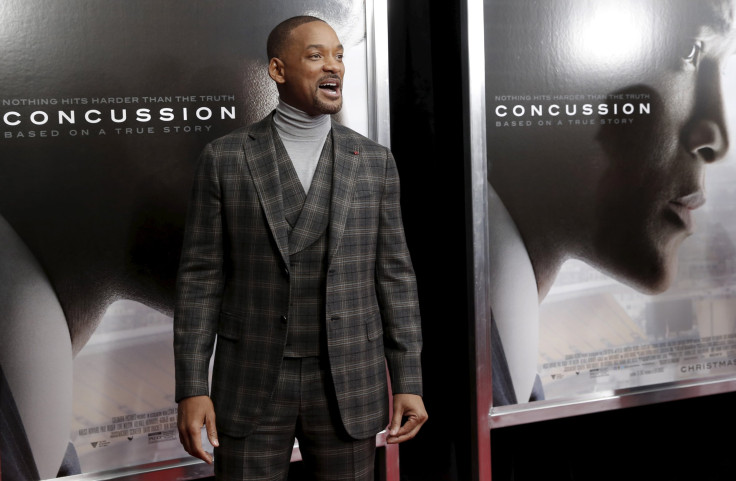'Concussion' Movie True Story? Real Facts Of Will Smith Film About NFL, CTE

Fans excited for college football bowl games and another weekend of NFL contests could be in for an eye-opening experience as the movie "Concussion," starring Will Smith, is set for its nationwide Christmas Day release Friday. The movie centers on the story of Dr. Bennet Omalu, who discovered and worked to diagnose the degenerative brain disease known as CTE in football players, which led to a crisis for the NFL.
As with most movies based on true stories, the plot of "Concussion" reportedly mirrors real-life events at times while deviating at others. Listed below are five quick facts about the true story behind "Concussion":
— Omalu discovered CTE, and the NFL pushed back against his findings: Much of "Concussion," at least according to trailers for the film, hinges on tension between Omalu's findings and the NFL's desire to keep it under wraps. CTE can have serious, if not lethal, symptoms. When Omalu first released the findings of a study in 2005 that noted football could endanger the mental health of players, handpicked NFL doctors pushed back against it, saying his work had flaws. In the long run, Omalu's work was vindicated.
— CTE is very real and has affected scores of NFL players: Thanks to the work of Omalu, CTE has been linked to concussions and repetitive subconcussive hits NFL players take during the course of their careers. Those who suffer from the degenerative brain disease often experience symptoms like memory loss, impaired judgment, troubles with impulse control, aggression, depression and dementia. A number of former NFL players who have committed suicide have been diagnosed with the disease after the fact, including Andre Waters, Dave Duerson, Ray Easterling and Junior Seau, according to the Atlanta Journal-Constitution. The disease can currently only be diagnosed posthumously, and Omalu first came across CTE studying the brain of deceased former Pittsburgh Steeler Mike Webster. Eighty-seven of 91 former NFL players who donated their brains, suspecting they suffered from the disease, were found to have CTE, according to research from the U.S. Department of Veterans Affairs and Boston University in 2015, via CNN.
See the movie about one man with the courage to make a difference - #ConcussionMovie in theaters Christmas Day.
https://t.co/qxrWYGxX63
— Concussion Movie (@ConcussionMovie) December 12, 2015
-Government officials did not raid Omalu because of his work on NFL and CTE: According to an article on Slate, "Concussion" depicts a scene in which federal officials raid the office of Omalu's boss, and the doctor yells, "You are attacking him to get to me," indicating the government was going after him for threatening the business of the NFL. Slate points out that Omalu's boss' office was raided months before Omalu's first research on the subject was published and had nothing to do with the football study.
-Omalu inspired a larger story, which inspired the movie: A 2009 article in GQ profiling Omalu marked a turning point in the story. Later that year the NFL acknowledged that concussions suffered playing football were linked to long-term health effects. Director and writer Peter Landesman based the movie on that GQ article.
-Questions were raised about the NFL's influence over the film: The league has been relatively silent during the weeks leading up to the movie's release. But emails leaked as a part of a massive hack at Sony showed Smith and Landesman talking with the NFL to avoid antagonizing the league, framing it more as a whistle-blower story than a condemnation of football, according to a New York Times report in September. Landesman said, however, that the movie made cuts to make the film better and closer to the original story. “We don’t want to give the NFL a toehold to say, ‘They are making it up,’ and damage the credibility of the movie,” he said to the Times. “There was never an instance where we compromised the storytelling to protect ourselves from the NFL,” he added later.
© Copyright IBTimes 2024. All rights reserved.






















